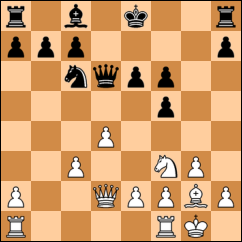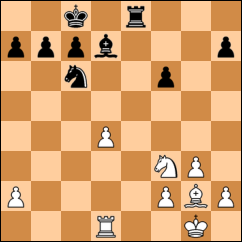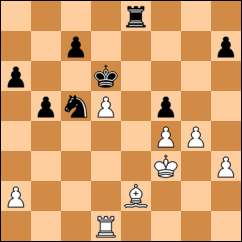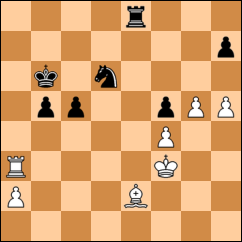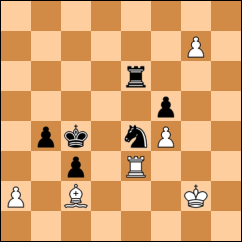K.Ammann–Z.Kauffman
Route 20 Chess Club
Freeport, Ill., June 14, 2011
1.d4 f5 2.g3 Nf6 3.Bg2 e6 4.Bg5 Be7 5.Nf3 Nc6 6.c4 d5 7.cxd5 Qxd5
Zach is a very strong beginner, but a beginner nonetheless. A more experienced player would automatically choose 7...exd5, holding white to a slim advantage.
8.Nc3 Bb4 9.Bxf6 gxf6 10.0-0 Bxc3 11.bxc3 Qd6 12.Qd2
12...Bd7 13.Qh6 Qf8 14.Qxf8+ Rxf8+ 15.Rfe1 0-0-0 16.Rad1 e5 17.e4
Well, I never claimed I was infallible. With 17.e3!?, I hold my edge. Now the game is equal.
17...fxe4 18.Rxe4 exd4 19.cxd4
Alternatively, I can recapture with the knight: 19.Nxd4 Bf5 20.Rf4 Nxd4 21.Rdxd4 Rxd4 22.Rxd4 Re8.
19...Rfe8
Zach can play 19...Bf5 to move his bishop to a better location with tempo.
20.Rxe8
Or I can play 20.Rf4!? and take aim at the newly unprotected pawn.
20...Rxe8
Recapturing with the bishop is much nicer for Zach: 20...Bxe8 21.Bh3+ Kb8 22.Bf5 is mostly bark.
21.Kf1
Thinking to keep Zach's rook from entering on e2. But 21.a3 accomplishes the same goal of pawn safety and keeps his knight off b4 as well.
21...Bg4 22.h3 Bxf3
Zach does not benefit from this trade. The pin can be held momentarily with 22...Bh5!?, after which I'm obviously going to play 23.g4, but the bishop is perfectly content to relocate to f7.
23.Bxf3 Kd7 24.d5 Ne5 25.Be2
Erp, not so good. If I want to keep my newly regained advantage, 25.Be4 is the correct move, forcing 25...h6.
25...Kd6 26.f4
26.Rd4 is called for.
26...Nd7 27.Kf2 Nc5 28.Kf3 f5
28...Re4 is aggressive. White has to reply 29.Rd2 in anticipation of 29...Ra4.
29.Bc4
A nothingburger. I should play 29.g4 immediately.
29...a6 30.g4 b5
How about some forcing moves: 30...Re4 31.Bd3 Ra4 32.Bxf5 Ra3+ 33.Ke2 Rxa2+ 34.Kf3 Ra3+ 35.Kg2.
31.Be2
The counterintuitive 31.Bd3! is better, because it forces a favorable trade (31...Nxd3 32.Rxd3). Black can't take the hanging pawn because of a discovered check: 31...Kxd5?? 32.Bxb5+! Ke6 33.Bxe8.
31...Rf8
This move doesn't make much sense, and Zach seems to realize it right away. What else can he do? 31...Ne4 is strong, because 32.gxf5? doesn't work: 32...Nc3 33.f6 Nxd1 (not the much weaker 33...Nxe2?! 34.f7 Rf8 35.Kxe2) 34.Bxd1 Kxd5 is superb for black. White must therefore reply 32.Bd3 Nc3 33.Rd2 fxg4+ 34.hxg4, with a slight advantage for black.
32.g5
Too soon.
32...Ne4 33.Rd3 Re8 34.Ra3
Not as clever as it looks. 34.Bd1!? is worth looking at.
34...Kxd5 35.Rxa6 Nd6
35...Nd2!? 36.Kf2 b4 37.Bf3+ Kd4 is a little better.
36.Ra5 Kc6 37.h4 Kb6 38.Ra3 c5 39.h5
39.Re3!? bears a closer look. Zach can't afford to accept the trade, thus 39...Ra8 40.Re6 Ra3+ 41.Kf2, with a slight advantage for white.
39...c4!
Zach seizes the moment.
40.Re3 Ne4 41.Kg2?
Wrong answer. 41.Bd1 Kc5 42.Ra3 Re7 is necessary.
41...c3
Hold up on that moment, Zach. 41...Ra8 42.a3 Kc5 makes things way easier for you.
42.Bd3 b4 43.Kf1
I'm making a hash of this endgame. Better is 43.Kf3!? Kc5 44.g6 hxg6 45.hxg6.
43...Kc5 44.Bc2 Kc4
44...Rd8 45.g6 hxg6 46.hxg6 is big for black.
45.Kg2
No. 45.Ke1.
45...Re7
Or 45...Ra8 46.Bb1.
46.g6?
No. I have to play 46.Kf3 if I want to live.
46...hxg6 47.hxg6 Re6??
47...Rg7 48.Rxe4+ fxe4 49.Bxe4 Re7 does a number on me. In contrast, 47...Re6 allows the exchange sacrifice 48.Rxe4+!! fxe4 49.f5. Which is a necessary precursor for . . .
48.g7??
See, if there's a pawn on f5, this move doesn't merit the double what. Since there isn't, it does, and Zach now has the opportunity to take me apart. Which he proceeds to do. I'm so proud of him.
48...Rg6 49.Kf3?! Rxg7 50.Bxe4 fxe4+ 51.Rxe4+ Kd3 52.Re3+ Kc2 53.Ke2 Rg2+ 54.Ke1 (54.Kf3 Kd2 55.Re4 offers some faint hope) 54...Kb2 55.f5 c2 0-1
It's over. Good job, Zach.

